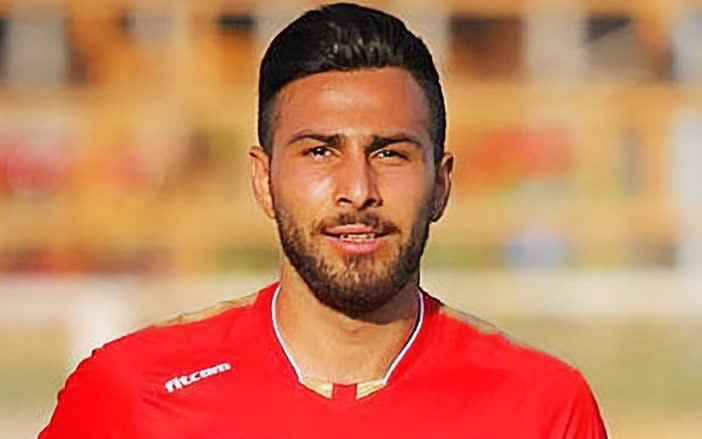Iranian footballer sentenced to execution for 'campaigning for women's rights'

An Iranian footballer who took part in protests against the regime is facing execution, despite pleas for mercy from a former national team captain and other sport stars.
Amir Nasr-Azadani, who once played for the national under-16s team, was arrested in September for allegedly taking part in an “armed riot” in Isfahan in which three members of the security forces were killed.
The 26-year-old defender with Iranjavan Bushehr FC was charged with “rebellion, membership in illegal gangs, collusion to undermine security and therefore assisting in moharabeh”.
The charge of moharabeh, meaning “waging war against God”, carries the death penalty in Iran.
As it struggles to put down nationwide protests that have shaken the legitimacy of the regime, Tehran has proudly announced the hanging of two protesters this month, sparking fears of the imminent executions of those charged with moharabeh.
Amnesty International claims that 11 people have already been sentenced to death over the protests and at least another nine, including Mr Nasr-Azadani, face the death penalty.
Thousands of people are thought to have been arrested since protests began after the death of 22-year-old Mahsa Amini in the custody of Tehran’s morality police in September.
Iran’s judiciary said on Tuesday that 400 people in the capital alone have been handed jail sentences of up to 10 years over their involvement in the protests. “In hearings on cases of rioters in Tehran province, 160 people were sentenced to between five and 10 years in prison, 80 people to two to five years and 160 people of up to two years,” a spokesman for Tehran’s judiciary said.
On Monday, FifPro, the international players union, said it was “shocked and sickened” at the reports that Mr Nasr-Azadani could face execution “after campaigning for women’s rights and basic freedom in his country”.
Fifpro said it stood in solidarity with Mr Nasr-Azadani and called for the “immediate removal” of his sentence.
FIFPRO is shocked and sickened by reports that professional footballer Amir Nasr-Azadani faces execution in Iran after campaigning for women’s rights and basic freedom in his country.
We stand in solidarity with Amir and call for the immediate removal of his punishment. pic.twitter.com/vPuylCS2ph— FIFPRO (@FIFPRO) December 12, 2022
Current and former professional football players have called for clemency. Alireza Beiranvand, Iran’s goalkeeper, and former team captain, Masoud Shojaei, have shared images on social media in support of the young player. Ali Karimi, a former Iran international, who has been a vocal supporter of the protest movement also backed the footballer, said on Twitter: “Do not execute Amir.”
Mr Nasr-Azadani played for Persian Gulf Pro League side Tractor between 2016 and 2018, after a short season-long spell with Rah Ahan in 2015-16. He has not played professionally since his last appearance in November 2017.
On Monday Majidreza Rahnavard became the second protester to be publicly hanged. Rights groups have said that both of the deaths were the result of “sham trials” with no due judicial processes.
The United States State Department condemned Iran for Mr Rahnavard’s execution.
State department spokesperson Ned Price said on Monday: “We denounce this draconian treatment in the strongest terms. These harsh sentences and now the first public execution... are meant to intimidate Iran's people. They're meant to suppress dissent.”
Two former Iran national team footballers who were arrested on charges relating to the countrywide protests were released from custody last month on bail. Right-back Voria Ghafouri, who was arrested for ‘tarnishing the reputation of the national team and spreading propaganda against the state”, and former goalkeeper Parviz Boroumand were both detained for attending protest rallies in Tehran.
Their release came just hours before the national team’s final World Cup match against the United States in Qatar, which was deemed a move to try and ease tensions and placate growing anger that had been highlighted by protests at the global football tournament.

 Yahoo Sports
Yahoo Sports 
